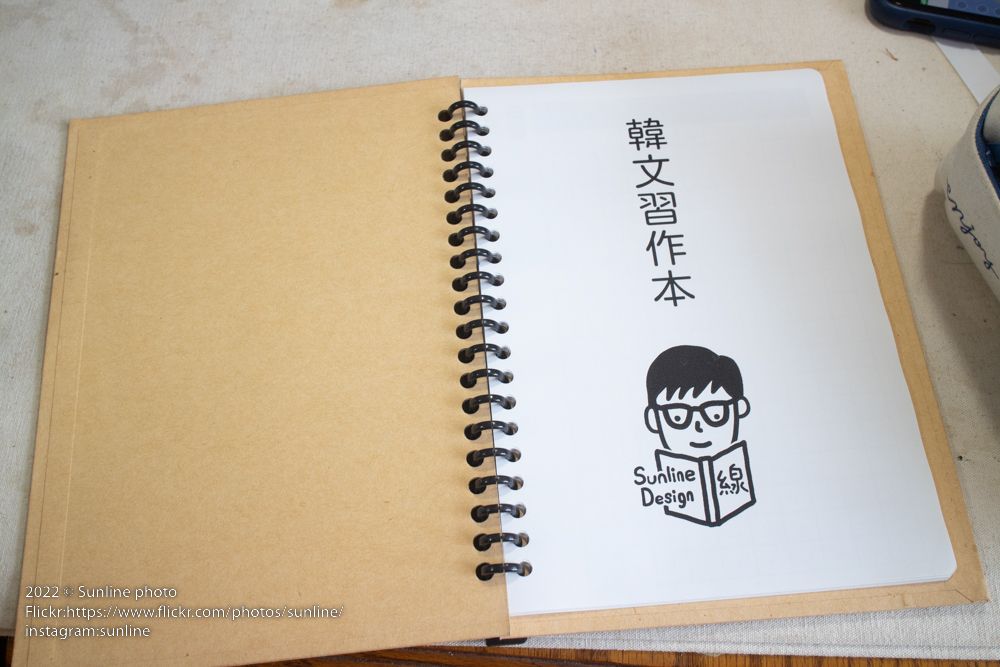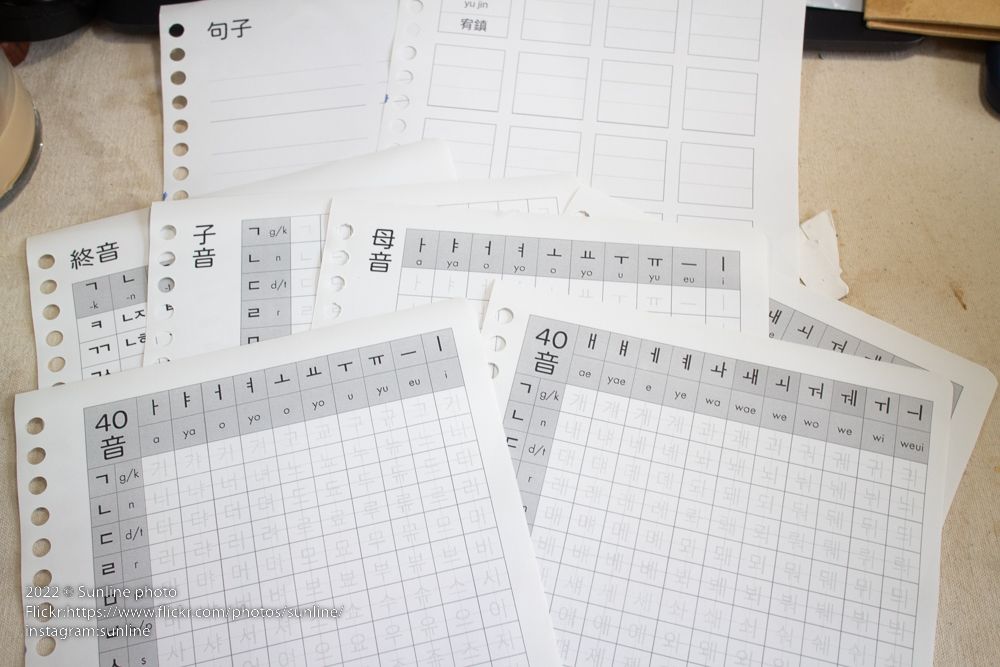
換日線。台灣高雄人。二十歲後流浪到台北工作七年後回高雄定居至今。從事接案工作十餘年。大多數時間從事的事都跟書和出版社有關。更多內容請看置頂關於我,或至我的個人網站:https://www.sunlinedesign.com.tw/,e-mail:sunline.liu@gmail.com
Ah Xian Learning Korean Homemade Alphabet Study Book

When I traveled to Japan, I felt the most unfortunate thing was that I couldn't speak Japanese, so I couldn't chat with passersby occasionally. A few times, I have met a few homestay owners who can speak Chinese, and I can ask some local secret attractions or get information from the locals on the time arrangement, which is very convenient. Among them, I met a Chinese who immigrated to Tokyo from Tianjin a few times, and a Hong Konger who came to Japan very early to cultivate. The rest are Japanese whose English is as broken as me but can still have simple conversations occasionally.
I’ve been to Japan a few times, and it’s okay to rely on Chinese characters as long as I can write them, and I don’t need to speak a simple conversation. In addition, I’ve watched Japanese dramas since I was a child, and some words can still be heard and spoken. stand up.
Before I went to Korea in 1999, my impression of Korea probably stopped in those Korean dramas with handsome guys and beauties with weird Chinese tones broadcast on Taiwan Channel 4, and in the baseball soul of "I really want to win Korea". In particular, I don't like Korea and I haven't been brainwashed by the Korean wave. I've watched a lot of Korean movies, but I haven't watched a Korean drama seriously. Going to Korea is not like going to Japan. When I go back to Taiwan, I want to learn the language well.
Until I finished watching "Mr. Sunshine", because I liked the protagonist in this drama so much, I searched the Internet and found that someone wrote the script word for word, but I could only read it with Google Translate (or the Korean version is very useful). papago app and website ). Publishing scripts in South Korea seems to be a common thing. The more popular ones such as "Signal", "Secret Forest", "Although It's Neurotic But It's Okay"... have all been translated into Taiwan versions (I bought them all, but I didn't actually have them.) Watching a drama), but there are more Korean versions without a Taiwanese version (such as "Our Blues Time"), so the brainwaves are very weak and want to read the script and start to "want to learn Korean".
When I started to understand Korean, I had to memorize the consonants and vowels, and then I found that even the fifty sounds were incomplete. I could quickly remember the pronunciation rules of Korean (it has a certain logic), although I couldn’t read the words fluently and coherently. I read it out in response, but I can spell out as many words as I can, and I can slowly read the Korean words that I can see every day.
Before Hangeul entered grammar, it should be more difficult to combine forty tones followed by 받침 (final or final), which has a bunch of ligatures and variations. The most interesting thing is that if you have a certain basic knowledge of Taiwanese, you will find that many Koreans are not only foreign words with English pronunciation like Japanese, but also many Japanese pronunciations that became Taiwanese loanwords during the Japanese colonization of Taiwan. Or similar to the pronunciation of Taiwanese (of course, there are many pronunciations of Chinese characters.)
Pronunciation takes a little time to practice how to pronounce them together, and writing good-looking Korean is more difficult than writing Chinese. Part of it is of course also because it is not a language from elementary school. To write well like Chinese that has been written for decades, it still needs to go through the process of children learning to write.
Although there are many copybooks in the market, as a design and typesetting professional, I would like to practice "I want to have a writing layout that I can learn smoothly by myself". So I lined up in the east and touched the west, and made a document that can be printed out.
Originally, I wanted to make an A4 small notebook that can be stapled into A5 size (and I wanted to make it to sell it for money), but later I felt that it was not easy to count the number of pages with folded pages, and the staples had to be cut, so it is better to use them by hand. To print on A5-sized loose-leaf paper, the original A4-sized form will be split into an A5-sized loose-leaf book.

The parts with vowels, consonants, finals, and forty tones are marked with pronunciation, as well as the grids of words and sentences on two pages (they have three columns, and can be written in Korean, pronunciation, and Chinese) in the practice grid. All can be written in light grey. But since I'm an idiot in Korean (along with typing), there may be errors, if anyone proofreads a typo let me know, and I'll change the same file to keep it in the most correct state.
If you need it, you can download it here . All are single-sided printing, and the holes of the loose-leaf paper are on the left hand side. When printing, the paper should be placed correctly, otherwise it will be too close to the holes.
Later, when learning sentences, some common example sentences will also be made into practice transcription pages for everyone to download.
Then I've been a bit busy recently, except for sports, I have some cases going on, and I'm also busy watching Korean dramas, movies (also half-studying Korean film and television) and learning Korean. The rhythm of writing is slow and not forced to write every day. (There is still something to write, but the mind will want to do other things.)
If you are interested, let's learn Korean together! It's not easy to write good-looking Korean characters. But in the process of learning, I still feel that Chinese people who can write traditional Chinese characters are very good. After all, not only the pronunciation of the characters, but also the corresponding glyphs and grammar, is really a powerful thing!
Figure: My self-made cover XDDDD and inner page style
Like my work?
Don't forget to support or like, so I know you are with me..
Comment…